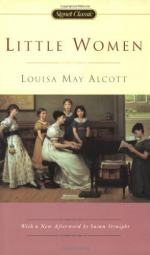“Just a year ago we were groaning over the dismal Christmas we expected to have. Do you remember?” asked Jo, breaking a short pause which had followed a long conversation about many things.
“Rather a pleasant year on the whole!” said Meg, smiling at the fire, and congratulating herself on having treated Mr. Brooke with dignity.
“I think it’s been a pretty hard one,” observed Amy, watching the light shine on her ring with thoughtful eyes.
“I’m glad it’s over, because we’ve got you back,” whispered Beth, who sat on her father’s knee.
“Rather a rough road for you to travel, my little pilgrims, especially the latter part of it. But you have got on bravely, and I think the burdens are in a fair way to tumble off very soon,” said Mr. March, looking with fatherly satisfaction at the four young faces gathered round him.
“How do you know? Did Mother tell you?” asked Jo.
“Not much. Straws show which way the wind blows, and I’ve made several discoveries today.”
“Oh, tell us what they are!” cried Meg, who sat beside him.
“Here is one.” And taking up the hand which lay on the arm of his chair, he pointed to the roughened forefinger, a burn on the back, and two or three little hard spots on the palm. “I remember a time when this hand was white and smooth, and your first care was to keep it so. It was very pretty then, but to me it is much prettier now, for in this seeming blemishes I read a little history. A burnt offering has been made to vanity, this hardened palm has earned something better than blisters, and I’m sure the sewing done by these pricked fingers will last a long time, so much good will went into the stitches. Meg, my dear, I value the womanly skill which keeps home happy more than white hands or fashionable accomplishments. I’m proud to shake this good, industrious little hand, and hope I shall not soon be asked to give it away.”
If Meg had wanted a reward for hours of patient labor, she received it in the hearty pressure of her father’s hand and the approving smile he gave her.
“What about Jo? Please say something nice, for she has tried so hard and been so very, very good to me,” said Beth in her father’s ear.
He laughed and looked across at the tall girl who sat opposite, with an unusually mild expression in her face.
“In spite of the curly crop, I don’t see the ‘son Jo’ whom I left a year ago,” said Mr. March. “I see a young lady who pins her collar straight, laces her boots neatly, and neither whistles, talks slang, nor lies on the rug as she used to do. Her face is rather thin and pale just now, with watching and anxiety, but I like to look at it, for it has grown gentler, and her voice is lower. She doesn’t bounce, but moves quietly, and takes care of a certain little person in a motherly way which delights me. I rather miss my wild girl, but if I get a strong, helpful, tenderhearted woman in her place, I shall feel quite satisfied. I don’t know whether the shearing sobered our black sheep, but I do know that in all Washington I couldn’t find anything beautiful enough to be bought with the five-and-twenty dollars my good girl sent me.”




